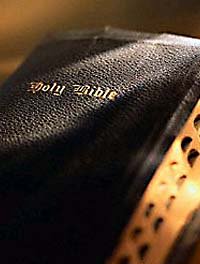James 2:17: "Your Faith is Dead as a Door Nail!"
What was seen in the individual in the example of vss. 15-16 is now applied to the specific faith that the individual in vs. 14 claimed to have. What we see is that faith without works is just like words without deeds. The words of the uncaring person who fails to act to help a person in need are as useless as a profession of faith from a person who does not have works. Again, we should not see works as an added extra to faith, but rather as the only expression of faith. This is very important to understand. Our works, if they are not a properly motivated expression of faith, are no good. This is why the writer of Hebrews twice, in 6:1 and 9:14, claims our works to be dead in light of the work of Christ. Our works do not add anything to what Christ did. Think about what the implication of a Christ plus works theology leads to. If our works are needed, even just a little bit, that means that Christ work was not completely sufficient to save. We had to add just a little bit more to what Christ did in order to be saved. This is not at all how the Bible portrays the death of Christ. Look at what Scripture tells us Christ did.
Luke 19:10: “For the Son of Man has come to seek and to save that which was lost.”
Galatians 1:3-4: Grace to you and peace from God our Father and the Lord Jesus Christ, who gave Himself for our sins so that He might rescue us from this present evil age, according to the will of our God and Father…
Titus 2:14: …who gave Himself for us to redeem us from every lawless deed, and to purify for Himself a people for His own possession, zealous for good deeds.
Romans 3:24-25: being justified as a gift by His grace through the redemption which is in Christ Jesus; whom God displayed publicly as a propitiation in His blood through faith. This was to demonstrate His righteousness, because in the forbearance of God He passed over the sins previously committed…
Galatians 3:13: Christ redeemed us from the curse of the Law, having become a curse for us…
1 Corinthians 1:30: But by His doing you are in Christ Jesus, who became to us wisdom from God, and righteousness and sanctification, and redemption…
(Our good works stem from the work of Christ, who is our wisdom,
righteousness, sanctification, and redemption. Paul clearly asserts
that Christ did not make these things available to us, but rather he is
these things for us.)
Scripture makes it clear that Christ’s work accomplished these things; it did not make these things possible. We cannot add to the accomplished work of Christ. Even if we were able to, how could we add anything to what has already been accomplished (Accomplished is exactly what Christ claims his work to be in John 19:30.)? By properly understanding the work of Christ, we can properly understand the working faith that James requires.
Works are not an added extra to faith anymore than breath is an added extra to a living body. If you take the breath from a living body it is no longer living. You can say whatever you would like about a corpse that you claim to be alive, but if it never moves, there is no heartbeat, no detectable pulse, and it is not breathing then it is dead. The false claim of life will prove to be silenced by the evidence. Just as the corpses without breath is dead, so too Faith without the breath of works is dead. The only thing that this faith has is the claim that is it is alive. There is no functioning, nor is there any sign of life. This kind of faith, which is mere talk, is void of all reality.
James has figured out why this faith is not producing fruit; because it is dead. It is dead in its roots as well as in its branches. Think about an apple tree. If you saw a tree that was supposed to be an apple tree, but it did not have apples or even leaves on it what would you think of that tree? If someone claims to have faith and yet his life does not produce the fruit of faith what are we to think of that? The absence of works, the natural fruit of faith, proves that this faith is lifeless in the same way that compassion which expends itself in words only is counterfeit. This saying only kind of faith is not merely outwardly inoperative, but inwardly dead as well. It is not a matter of adding works to such a faith. Rather, this is not faith. Faith is the grand principle which no man can be a Christian without; but it must be the kind of faith that God requires. It must be true faith in the work of our Lord Jesus Christ alone to save us from the great penalty of sin.
The faux faith of this person was “dead, being by itself.” There are several different translations of this verse that are represents in the English Bibles that we use. The KJV reads “being alone.” This is not really a good translation because it gives the wrong idea about what James is trying to convey. The KJV gives the impression that the faith is ok but it needs works also. This is not at all what James is saying. For James it is not a matter of adding works to this faith; the point is that this is not faith at all. Most modern English translations read something to the effect of “being by itself.” This is not a bad translation, but I think that “as measured by itself” would be a much better translation. The point is that when you measure this faith by its very own claims it proves to be dead. The claim of this faith is that you have submitted to Christ as your Lord and Savior; and that the loving mercy of God had made you a new creature through the work of Christ. This is what the claim of being a Christian is. If you were to measure this person’s life by this claim you would have to say that he is lying. Faith that does not contain within itself a readiness to help, and to show mercy cannot be a faith in the mercy of God. And so when we compare the claim to faith, with the life of this man we must conclude that what he has is not faith. According to its own showing it is dead. Such an unproductive showing cannot come from someone who has been made a new creature in Christ, can it?
The contrast is not between faith and works, but rather between dead faith and living faith. Look at what Galatians 5:6 says. Here Paul reminds us not that find any advantage in our good deeds by themselves; but that we will find our advantage in our faith. Our works do not count for anything, but our faith does. We must remember that or else we will get confused. In order for faith to be beneficial it cannot be a human work. Our faith must be directed towards Christ who then becomes our wisdom, righteousness, sanctification, and redemption. The point of Paul in Galatians and James here is that faith without works is dead. In Galatians Paul says that faith will result in loving actions. Love is an action; it is purposing someone else’s good above our own good. But Paul is talking about the results of faith, not the substance of faith. The reason faith saves is because its substance (or the object of the faith) is God not us, and so if we say that faith is a work its substance becomes man instead of God. The point is quite practical. We cannot see, or measure faith, but we can see the results of it. We can see the proof of it. It would be quite illogical to say that the result or proof of something is the object itself wouldn’t it? Paul’s point, as well as James’, is that the only thing that counts in our life is the work that God does.
Concerning this subject John Calvin wrote, “it is faith alone that justifies, but faith that justifies can never be alone.” When we begin to realize just how powerful the Gospel of Grace is we will begin to understand that difference that it will make in our lives. If we are to measure faith by what it claims to be then it must have works to accompany it.
James has spent some time investigating this saying-only kind of faith. His conclusion is that when you measure the works of this man by the claims of this man his faith proves to be dead. What is the profit of dead faith? Dead faith is of no profit because it is unable to save anyone. Such a faith as this may recite the correct words, but unless there has been a true commitment to Christ as one’s Lord and Savior it is powerless to save. The power of the Gospel does not reside in faith by itself, or human achievement. The saving power of the Gospel resides in the Savior on whom our faith rests. For James faith is just shorthand for faith in Christ. It is when we have this true faith in Christ that we will experience “the power of God unto salvation.” (Romans 1:16)
Romans 10:9 teaches that if we confess Jesus as our Lord, and believe that God raised him from the dead we will be saved. James is not contradicting this, but rather adding that your belief must be true belief or else it is of no profit. To steal the words of Rich Mullins “faith without works is like a screen door on a submarine.” What is sad is that God has made this wonderful plan of salvation available to mankind, yet so many people want to do it their own way instead. So many people would rather just show up to church and say the right things without having the power of the Gospel change their lives. They don’t want to give up their sins; they don’t even want to admit their sins. In doing this these people are missing out on the greatest joy they could ever have. They are forgoing the freedom that comes from God’s grace for the bondage of sin. They may think that they are making the choice to choose freedom, but they are really choosing slavery. They are choosing death.










